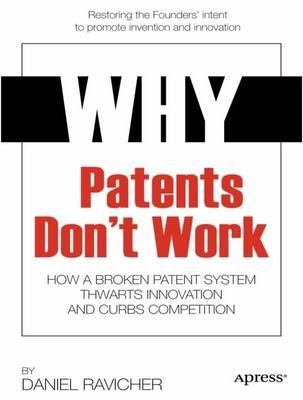
Why Patents Don't Work
Apress (Verlag)
978-1-4302-4071-6 (ISBN)
- Titel wird leider nicht erscheinen
- Artikel merken
After walking the reader through the history of the modern-day patent system, Why Patents Don't Work provides example after painful example of how the system today threatens not just product development and economic competition but routine aspects of daily life like health care and means of communication. Why Patents Don't Work concludes with a call for society to enact the necessary reforms that will ensure the patent system regains its ethical and moral underpinnings and once again benefits all Americans. This book: * Tells the story of how the patent system evolved from the time our Founders included it in the Constitution, when it was intended to promote progress, to today, where it often rewards those companies and individuals who understand, and are willing to spend to win, the game. * Describes the overall harmful effect today's patent system has on society, both economically and socially.
* Tells the stories of patent "trolls" who extract dubious license fees, threaten lawsuits, and slow down the economy; of large companies, working with research universities, that attempt to patent things like human genes and stem cells; of taxpayer-funded research projects that result in privately held patents; and of patents granted for sequences of activities--even such things as how to use mock trials to prepare for a real one. * Suggests concrete ways we can revive the true purpose of the patent system in order to ensure America remains the world's leading technological innovator while respecting fair competition and individual liberty. What you'll learn You will learn: * The reason patents were important to our Founders and included in the Constitution. * How the patent system was transformed through a series of unchecked government actions in the 1980s into a system of entitlements rewarding legal manipulation and technological laziness. * Where the patent system is still functioning as intended and why. * The economic harm caused to society by today's patent system. * How today's patent system works to restrict individual freedom and free markets.
* What can be done to recapture the glory of the patent system and return it to its original purpose. Who this book is for Why Patents Don't Work: How a Broken Patent System Thwarts Innovation and Curbs Competition is for anyone concerned about how patents, one of the building blocks of an advanced economy, are now often used as weapons to create product monopolies or extract license fees. It's for basement inventors who need to understand the challenges they face in getting rewarded for their sweat. And it's especially for those in the tech world--hardware and software both--worried that the the day's mail will bring a patent-related cease-and-desist letter or demand for a license fee.
Daniel B. Ravicher is executive director of the Public Patent Foundation (PUBPAT), a not-for-profit legal services organization protecting freedom in the patent system. Under Ravicher's direction, PUBPAT has successfully challenged undeserved patents on software, pharmaceuticals, and the Internet to provide the public the access to technology it rightfully deserves. Labeled a modern day Robin Hood by Science magazine, and awarded an Echoing Green Fellowship for being one of the world's leading social entrepreneurs, Ravicher is a registered patent attorney who writes and speaks frequently on patent law and policy, including twice testifying as an invited witness before Congress on the topic of patent reform. As a result of his accomplishments and professional reputation, Ravicher was named to both Managing Intellectual Property magazine's 50 Most Influential People in IP list and IP Law & Business magazine's Top 50 Under 45 list.
Introduction
Part I: America's Patent System Before 1980
Chapter 1: Our Founders' Vision for a Patent System
Chapter 2: The First 170 Years of America's Patent System (1790s-1960s)
Chapter 3: Rise of Pro-Patent Politics, 1970s-1980s
Part II: Private Sector Captures Patent System, 1980-1984
Chapter 4: Patent Seekers Given Unbridled Public Subsidy for Research: Bayh-Dole Act, 1980
Chapter 5: Patent Holders Given Home Court Advantage: Federal Courts Improvement Act, 1982
Chapter 6: Pharmaceutical Patents Given Superpowers: Hatch-Waxman Act, 1984
Chapter 7: Supreme Court Reverses Course and Supports Patent Expansion
Part III: The Consequences of Having a Captured Patent System
Chapter 8: Patent Office Foundation Begins to Crumble
Chapter 9: Court System Becomes Inaccessible and Unpredictable
Chapter 10: Demise of Independent Inventors
Chapter 11: Rise of Patent Trolls
Chapter 12: Texas Provides Home for Trolls
Part IV: The Harmful Effects Of Today's Captured Patent System
Chapter 13: Patents Impeding Innovation and Competition
Chapter 14: Patents Chilling Civil Liberties and Individual Freedom
Chapter 15: The Effect of Patents on the Economy
Part V: Rescuing the Patent System
Chapter 16: Restoring Jeffersonian Quality
Chapter 17: Implementing Sound Economic Rationality
Chapter 18: Reasserting Morality and Ethics
| Erscheint lt. Verlag | 23.5.2021 |
|---|---|
| Verlagsort | Berkley |
| Sprache | englisch |
| Themenwelt | Geschichte ► Teilgebiete der Geschichte ► Technikgeschichte |
| Recht / Steuern ► EU / Internationales Recht | |
| Recht / Steuern ► Wirtschaftsrecht ► Urheberrecht | |
| Wirtschaft ► Betriebswirtschaft / Management ► Unternehmensführung / Management | |
| ISBN-10 | 1-4302-4071-7 / 1430240717 |
| ISBN-13 | 978-1-4302-4071-6 / 9781430240716 |
| Zustand | Neuware |
| Informationen gemäß Produktsicherheitsverordnung (GPSR) | |
| Haben Sie eine Frage zum Produkt? |
aus dem Bereich


